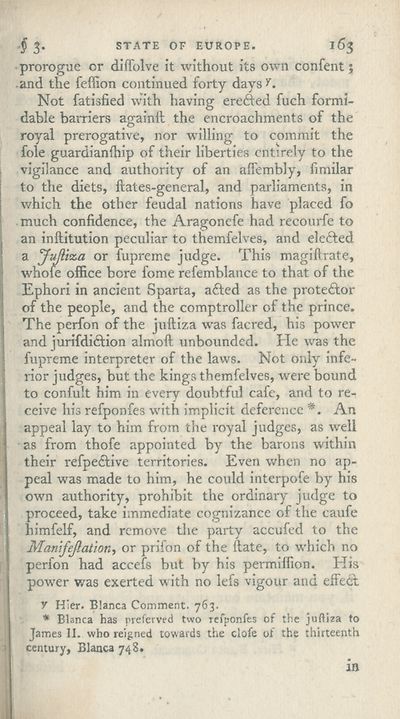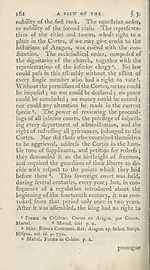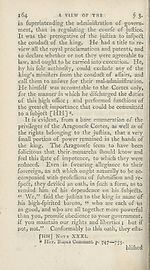Download files
Complete book:
Individual page:
Thumbnail gallery: Grid view | List view

■§ 3> STATE OF EUROPE. 163
prorogue or difTolve it without its own confent;
and the feffion continued forty days y.
Not fatisfied vvith having eredted fuch formi¬
dable barriers againll the encroachments of the
royal prerogative, nor willing to commit the
foie guardianlhip of their liberties entirely to the
vigilance and authority of an affembly, fimilar
to the diets, ftates-general, and parliaments, in
which the other feudal nations have placed fo
much confidence, the Aragonefe had recourfe to
an inftitution peculiar to themfelves, and eledfed
a Ju/liza or fupreme judge. This magiflrate,
whom office bore fome refemblance to that of the
Ephori in ancient Sparta, adted as the protedtor
of the people, and the comptroller of the prince.
The perfon of the juftiza was facred, his power
and jurifdidtion almoft unbounded. He was the
fupreme interpreter of the laws. Not only infe¬
rior judges, but the kings themfelves, were bound
to confult him in every doubtful cafe, and to re¬
ceive his refponfes with implicit deference *. An
appeal lay to him from the royal judges, as well
as from thofe appointed by the barons within
their refpedtive territories. Even when no ap¬
peal was made to him, he could interpofe by his
own authority, prohibit the ordinary judge to
proceed, take immediate cognizance of the caufe
himfelf, and remove the party accufed to the
Manfejlation, or prifon of the ftate, to which no
perfon had accefs but by his permiffion. Elis
power was exerted with no lefs vigour and effedt
Y Hier. Blanca Comment. 763.
* Blanca has preferred two refponfes of the juftiza to
James II. who reigned towards the clofe of the thirteenth
century, Blanca 748.
an
prorogue or difTolve it without its own confent;
and the feffion continued forty days y.
Not fatisfied vvith having eredted fuch formi¬
dable barriers againll the encroachments of the
royal prerogative, nor willing to commit the
foie guardianlhip of their liberties entirely to the
vigilance and authority of an affembly, fimilar
to the diets, ftates-general, and parliaments, in
which the other feudal nations have placed fo
much confidence, the Aragonefe had recourfe to
an inftitution peculiar to themfelves, and eledfed
a Ju/liza or fupreme judge. This magiflrate,
whom office bore fome refemblance to that of the
Ephori in ancient Sparta, adted as the protedtor
of the people, and the comptroller of the prince.
The perfon of the juftiza was facred, his power
and jurifdidtion almoft unbounded. He was the
fupreme interpreter of the laws. Not only infe¬
rior judges, but the kings themfelves, were bound
to confult him in every doubtful cafe, and to re¬
ceive his refponfes with implicit deference *. An
appeal lay to him from the royal judges, as well
as from thofe appointed by the barons within
their refpedtive territories. Even when no ap¬
peal was made to him, he could interpofe by his
own authority, prohibit the ordinary judge to
proceed, take immediate cognizance of the caufe
himfelf, and remove the party accufed to the
Manfejlation, or prifon of the ftate, to which no
perfon had accefs but by his permiffion. Elis
power was exerted with no lefs vigour and effedt
Y Hier. Blanca Comment. 763.
* Blanca has preferred two refponfes of the juftiza to
James II. who reigned towards the clofe of the thirteenth
century, Blanca 748.
an
Set display mode to:
![]() Universal Viewer |
Universal Viewer | ![]() Mirador |
Large image | Transcription
Mirador |
Large image | Transcription
| Antiquarian books of Scotland > Kings & rulers > History of the reign of the Emperor Charles V. > Volume 1 > (181) |
|---|
| Permanent URL | https://digital.nls.uk/109184503 |
|---|
| Description | By William Robertson. London : Cadell and Davies, 1798. |
|---|---|
| Shelfmark | ABS.1.76.13 |
| Additional NLS resources: | |
| Description | Thousands of printed books from the Antiquarian Books of Scotland collection which dates from 1641 to the 1980s. The collection consists of 14,800 books which were published in Scotland or have a Scottish connection, e.g. through the author, printer or owner. Subjects covered include sport, education, diseases, adventure, occupations, Jacobites, politics and religion. Among the 29 languages represented are English, Gaelic, Italian, French, Russian and Swedish. |
|---|

